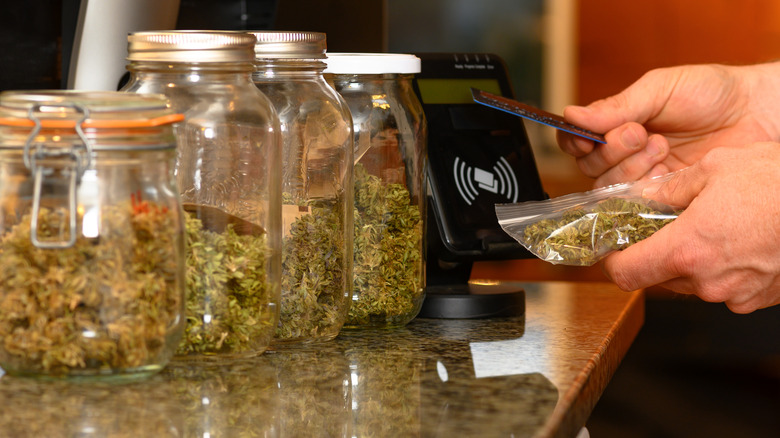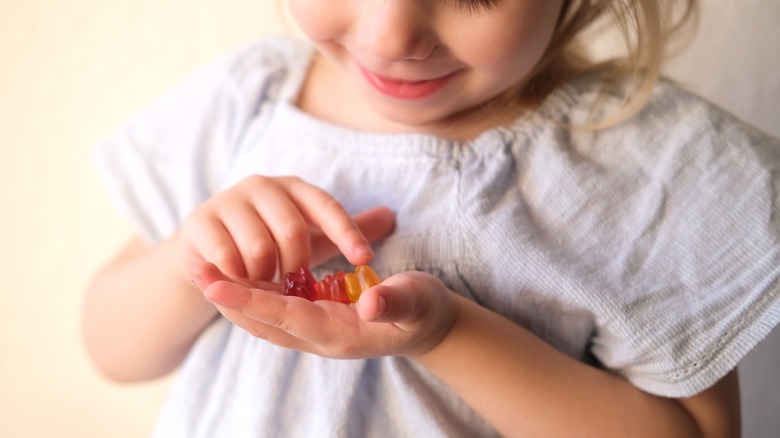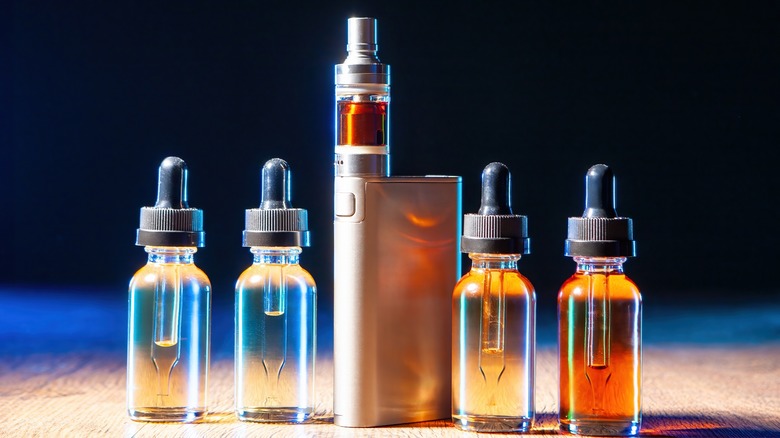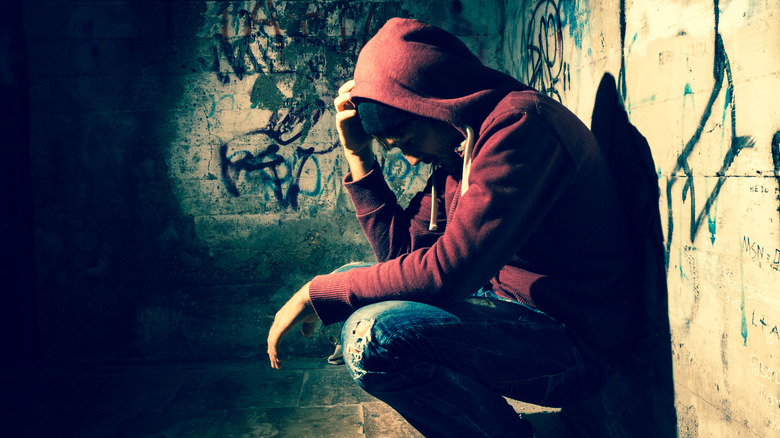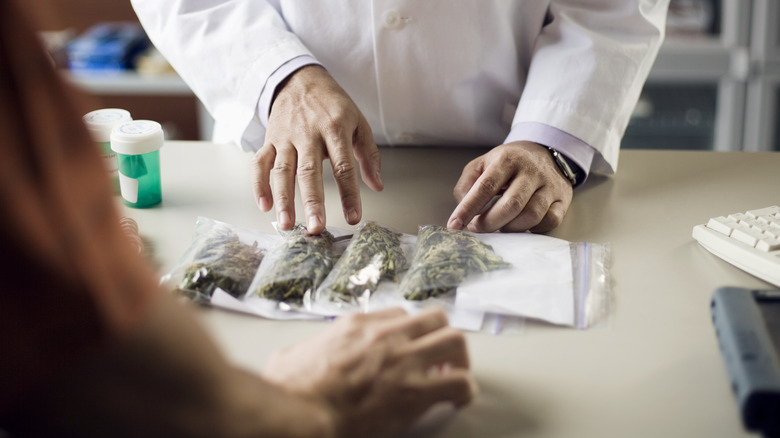Can You Overdose On Marijuana? Our Doctor Explains
With recreational marijuana now legal in 23 states in the U.S., more people are choosing to light up or engage in edibles. People who live in a state that has legalized marijuana are 20% more likely to use it compared to states that outlaw the drug, according to a 2022 article in Addiction. With that said, even though cannabis is legal, it doesn't necessarily mean it's not subject to overuse.
While some people might experience blackouts while drinking alcohol, people with too much THC in their system could experience "greening out," which might feel like a high accompanied by anxiety or panic, according to Psychology Today. A toxic reaction to THC could have symptoms of confusion, dizziness, paranoia, or disorientation. Although "overdose" has recently been associated with opioid addiction resulting in death, an overdose resulting in death from having too much THC in your system is less likely.
"While an individual cannot overdose on marijuana alone, reduction in inhibition or increases in impulsivity can lead to risk-taking behaviors with the potential of severe consequences, such as driving while intoxicated," said Dr. David Campbell, Clinical Director at The Canyon at Santa Monica. However, marijuana has led some people to wind up in emergency rooms.
If you or anyone you know needs help with addiction issues, help is available. Visit the Substance Abuse and Mental Health Services Administration website or contact SAMHSA's National Helpline at 1-800-662-HELP (4357).
Some groups are more sensitive to marijuana
Marijuana can present physical problems in people as more states legalize marijuana. A 2016 study in Clinical Toxicology looked at calls to poison control centers from 2013 to 2015. The patients complained about symptoms such as drowsiness, high heart rate, irritability, and confusion from edible forms of marijuana. About 91% of the calls came from states with legalized recreational marijuana, and about 25% of the calls concerned patients under the age of 5. A 2022 case study in Cureus centered on a healthy two-year-old boy who developed heart-related problems after accidentally consuming gummy candies that contained THC.
Visits to the emergency room for cannabis use have increased by 12% every year from 2006 to 2011, according to a 2022 study in Drug and Alcohol Dependence. The most significant increases were for patients under 14 and over 25. According to Popular Science, cannabis can be life-threatening for children because their bodies process the drugs differently than adults. Although no pets have died from a cannabis overdose, they can accidentally ingest an edible cannabis product. Dogs are more vulnerable to the effects of marijuana because they have more receptors for cannabis in their brains.
Older adults, particularly those with comorbidities, are also seeing more cannabis-related trips to the emergency room, according to a 2023 article in the Journal of the American Geriatrics Society. Emergency rooms in California saw an 18-fold increase in people over 65 using marijuana.
Some cannabis can be stronger
The first cannabis-related death was reported in 2019 when a coroner said she found no other drugs or alcohol in a 39-year-old woman's system. The woman also had no evidence of other diseases. The coroner believed the woman had vaped THC oil because she had 8.4 nanograms of THC per milliliter of blood in her system. Just 2 nanograms can impair your driving. However, an addiction researcher at the University of Toronto told The Advocate that a fatal dose of THC in someone's system would be 100 to 1,000 times higher than what was found in her system. That's like smoking 20,000 joints. According to the Drug Enforcement Administration, hashish and hashish oil are stronger versions of marijuana because they have the most THC. A drop of hashish oil in a cigarette is equal to a marijuana joint.
The THC levels in illegal cannabis have become more potent, according to a 2016 article in Biological Psychiatry. The study tested the THC potency of cannabis confiscated by the DEA between 1995 and 2014, finding that the amount of THC increased from 4% in 1995 to 12% in 2014. The ratio of THC to cannabidiol (CBD) increased from 14 times in 1995 to 80 times in 2014.
Frequent use can lead to cannabinoid hyperemesis syndrome
Campbell says that as marijuana has become more available and at higher concentrations, he's seen a significant increase in cannabinoid hyperemesis syndrome (CHS). "With significant intake amount and frequency, CHS can develop, which can cause severe bouts of abdominal pain, cyclic vomiting, and nausea, and only resolves through discontinuation of use," Campbell said. Although CHS is rare, it's associated with long-term, frequent use of marijuana (via American Addiction Centers).
According to the Centers for Disease Control and Prevention, three in 10 people who use marijuana have a marijuana use disorder. You're at a higher risk for this disorder if you begin using marijuana before age 18. Excessive or long-term use of marijuana can also put you at risk for psychosis or schizophrenia.
"When it comes to effects, signs, and symptom expression that can occur from consuming too much THC, many factors come into play, i.e., previous use/tolerance, biological factors, amount/concentration, frequency, and route of administration," he added. "Signs of overuse can range from anxiety to extreme confusion and paranoia. Other signs may also include heart racing/palpitation, nausea, altered states of consciousness, and more."
Inconsistent labeling in legalized marijuana
Even though marijuana is legal in many states, there's little regulation over the accuracy of the THC in the products. A 2023 article in PLoS One found that samples taken in Colorado dispensaries had significantly less THC than what was stated on the label. Dispensaries try to market their products as having higher levels of THC, but a lack of standardized testing protocols in legalized marijuana states can make it difficult to know how much THC you're getting.
First-time users of marijuana (or infrequent users) are more likely to experience a "greening out" if they use cannabis edibles, according to Psychology Today. That's because it's difficult to know how much THC you're getting in an edible unless it's commercially packaged. Because it takes longer for the THC to kick in with an edible form of marijuana, some people might consume more because they think it's not working. That could lead to having too much THC in your system.
If you're experiencing too much cannabis in your system, you can allow it to pass through your system without needing a trip to the emergency room. Stay in a safe, comfortable place, and reduce excessive sensory stimulation such as loud music or television. Take slow, deep breaths or practice meditation, if possible.
"Should a person be experiencing severe anxiety, confusion, paranoia, hallucination, or delusion and become a danger to themselves or others, seeking medical assistance may be necessary," Campbell said.

